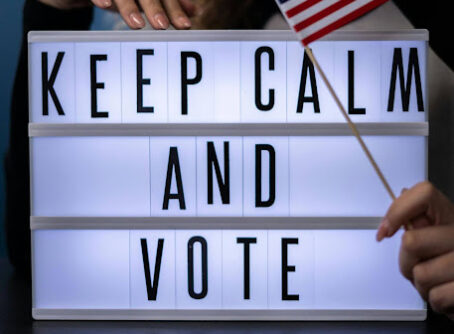
Picture this scene: in the thick of the global pandemic, a Muslim restaurant that has served as a pillar of its community for decades, as the only halal restaurant in the surrounding area, is struggling to remain in business. It is restricted to take-out orders, and sales just are not the same as they once were. They are two weeks away from laying off their staff and closing down when they hear about a new federal program that could help them keep their staff employed and their doors open.
The bad news is that the program is designed as a forgivable loan, rather than a grant. For most businesses, this would not pose a problem, but for the owners of this restaurant who are devout practitioners of Islam, it presented a mighty quandary. The tenets of Islam prohibit adherents from either offering or accepting interest-bearing loans, a practice called usury. Even though the loan received through the federal program is designed to be forgiven, it is still technically an interest-bearing loan, and devout Muslims would have some serious theological wrestling to do in the midst of a dramatic crisis that could lead many to unnecessarily shutter their operations.
Obviously, it is not policymakers’ intention that Muslims would be uniquely exposed to hardship in this way, but the policy was written in such a way that that was the reality. What I’m describing was a reality for Muslim business during the COVID-19 pandemic with the Paycheck Protection Program. Policymakers were presumably unaware of the variety of convictions existing in the country and therefore did not write the policy in a pluralistic, faith-conscious way.
A chief obstacle policymakers face is that when they enact their policies, there can be unintended consequences due to ignorance. In practice this can take various forms, whether in testing welfare policy on a small scale before national implementation, utilizing requests for comment to incorporate outside expertise, or even exempting various entities from the policy writ large. In any case, policymakers are not naive enough to presume that the laws and regulations they enact will do exactly what they intend and nothing else. The aim of policy making, then, is not a good outcome devoid of any negative consequences, but an outcome where the good outweighs the bad to a justifiable degree. With that being said, it is still important to consider the outcomes of a given policy apart from its intended area so that mitigation measures can be taken.
The aim of policy making, then, is not a good outcome devoid of any negative consequences, but an outcome where the good outweighs the bad to a justifiable degree.
While the PPP program was enacted as a means to give small businesses a a financial lifeline to make it through the lockdowns of the COVID-19 pandemic, it was written in such a way as to inadvertently exclude Muslims organizations. Ismail Royer, director of the Islam and Religious Freedom Action Team at the Religious Freedom Institute, noted in a webinar on the topic that the way the program was originally structured runs afoul of prohibitions on usury in the teachings of Islam. While structuring the assistance as a forgivable loan rather than a grant likely helped with budgetary considerations, it inadvertently caused an entire religious group to be left in limbo, if not excluded entirely. If the government is to uphold its duty to establish justice for all, it must take care that policy is shaped in such a way as to contour to the diversity of religious convictions in the country, not forcing citizens to conform their convictions to policy, especially in an area as intrinsically human as faith. It is my contention that the best way to accomplish this is to incorporate a diverse array of religious expertise, insight, and feedback into the policy making process. Liaison offices should be established by the White House for all major executive branch agencies. In similar fashion, the Congressional Affairs team should have staff prepared to consult and advise on these issues. These offices would each consult in their respective spheres of influence to ensure that policy is enacted in such a way that does justice to the many religious communities and identities in the country.
In addition to basic fairness concerns, there are theological implications of the idea of cross-cultural religious literacy, or the notion that people of various faiths can come to an understanding of each other’s beliefs without importing their own cultural frameworks, in policy making. A great way of understanding how different elements of society can relate to each other in terms of God’s plan for society is found within the idea of sphere sovereignty. The Dutch theologian and politician Abraham Kuyper developed a theological framework for understanding the roles of and relationships between various elements (or spheres) of society. This framework, sphere sovereignty, elucidates the role of institutions in society by placing them within the broader created order.
Sphere sovereignty is the idea that institutions exist as a part of a differentiated creation, that institutions themselves are created by, governed by, and accountable to God. It accounts for the diversity of creation, in its many different forms, while also affirming the centrality of God’s will amidst it all. It affirms both the right of institutions (spheres) to exist apart from the permission of other spheres, and the unity between them as created by God with a common purpose, thus allowing for collaboration. In terms of interpersonal, inter-religious dynamics, it holds that, apart from institutions with a distinct religious identity, there is no institution that can only be operated and managed by a particular faith.
Kuyper believed that if God has created different institutions with the same ultimate goal of fulfilling their unique vocation to the glory of God for the flourishing of creation, then they have a divine mandate to minimize friction that would hinder collaborative efforts.
In this case, government is called to work for the common good of all citizens and spheres within its territory in a pluralistic fashion, and faith-based institutions, whether charities, churches, or other private entities are called to fulfill their specific calling, in their specific niche, in their distinctly religious manner.
In this case, government is called to work for the common good of all citizens and spheres within its territory in a pluralistic fashion, and faith-based institutions, whether charities, churches, or other private entities are called to fulfill their specific calling, in their specific niche, in their distinctly religious manner. If a government policy is written in such a way as to disincentivize religious actors from participating on the same playing field as equivalent secular organizations, or treated them disfavorably on the grounds of their religious character, not only would the government be guilty of violating the tenets of pluralism, but it would also deny the faith-based organization the ability to fully fulfill its calling on the basis of its religious distinctives. Requiring citizens or groups to abandon their core convictions or otherwise change them around the preferences of policymakers is wholly incompatible with the role of government under the principle of sphere sovereignty. In the case of PPP loans, non-Muslim organizations were able to participate as the program intended, while Muslim organizations had to navigate choppy waters convictionally, possibly having to choose between closing their doors and violating their conscience. Such an event violates not only sphere sovereignty, but also another important principle over governance: principled pluralism.
Principled pluralism is the idea that public institutions need not be sanitized of the sacred in order to promote the public good. It wholeheartedly resists the notion that religious faith is merely a private devotion. It envisions a public life where people of all faiths and none can be fully faithful to live out their core convictions in pursuit of the common good. By ensuring that government policy achieves that good at which it aims while not compromising the good at which faith-based organizations aim, policy can thus best promote the common good and allow for faith based organizations to best offer their own unique contributions. The policy that I am advocating for takes all these considerations and places them alongside other relevant considerations in the policymaking process, rather than relying on feedback or other tail-end solutions. Such efforts I will be referring to as “proactive pluralism.”
The proactive pluralism approach that I suggest consists of restructuring and retooling the existing executive branch’s faith based outreach offices to create distinct offices within each department that advise on religious literacy policy matters. These offices exist primarily to engage relevant faith-based groups and integrate them into social services programs, rather than considering the impacts of the tenets of faith on policy and regulatory considerations writ large. It would make sense to find some way to leverage the expertise that comes from working directly with people of various faiths, while at the same time minimizing the direct impact they have on policy lest these offices become a government sponsored, special interest lobbying arm.
There are certainly reasonable concerns with such a policy, and while space does not permit me to address all of them, I will address two of them in particular. Firstly, an obvious concern is of these offices serving special interests rather than the overarching principle of proactive pluralism. I believe that existing precautions related to the equal protection clause and the establishment clause are well-suited to addressing this issue. Secondly, some may have a concern that religious groups that are more organized, hierarchical, and institutional would have more of a voice than those that are not. This concern is best addressed by an emphasis on progressive improvement through monitoring the guidance issued. While unlikely to lead to perfect equality in representation, I believe that we can reasonably expect positive outcomes from the implementation of the policy I am proposing.
Specifically for evangelical Christians, who are increasingly seen as just another self-interested voting block, stressing the importance of faith in public life in a way that doesn’t directly impact us will go a long way in increasing the credibility of religious involvement in the public square as a whole.
While concerns about cross-cultural religious literacy in policymaking may seem like a niche issue better left to the experts in Washington, this seemingly small issue has the potential to leave broad impacts on the relationship between faith and politics in this country. Specifically for evangelical Christians, who are increasingly seen as just another self-interested voting block, stressing the importance of faith in public life in a way that doesn’t directly impact us will go a long way in increasing the credibility of religious involvement in the public square as a whole. In a world that is determined to see faith as something that only impacts one’s private life, shaping public policy so that it reflects how intrinsic religious beliefs are to human identity legitimizes more broadly the efforts of faith based groups to oppose the secularization of public life and fight for a more faith-filled public square.
While the example of PPP loans and Muslim organizations is a glaring example of the need for cross-cultural religious literacy in policy making, it is far from an isolated incident and will continue to pop up in the future. In a country where 80% of the population considers themselves either spiritual or religious, it is important to make sure legislators craft policy in a way that does justice to the multiplicity of faiths and belief systems in the public square, perhaps especially those of minority groups. Over time, efforts like these to build bridges and understanding across religious barriers will become a great way in which a principled pluralism can be promoted and the privatization of religion can be resisted.






